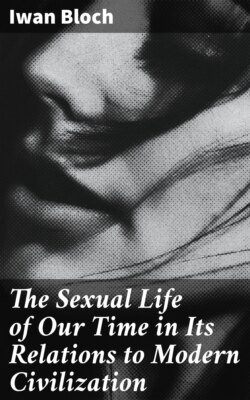Читать книгу The Sexual Life of Our Time in Its Relations to Modern Civilization - Iwan 1872-1922 Bloch - Страница 28
На сайте Литреса книга снята с продажи.
CHAPTER VI
ОглавлениеTable of Contents
If, with Friedrich Ratzel, we understand by civilization the sum total of all the mental acquirements of a period, then also human love, this specific product of civilization, is merely a mirrored picture of the mental activities of the existing epoch of civilization. We can follow this way of the spirit in love from the primitive age down to the present day, and we can detect, in each successive epoch of civilization, the association with sexuality of peculiar spiritual states; and after thus passing in review the thousands of years of human history, we can discern once more in our own epoch the individual psychical elements which characterize the love of modern civilized man.
The increasing spiritualization and idealization of sensuality in the course of civilization, notwithstanding the persistence of the elementary intensity of the sexual impulse, is associated with the fact to which we have already alluded—namely, the preponderance of the brain characteristic of the genus homo—a preponderance which was unquestionably gradually acquired, and arose in consequence of an accumulation of original variations which gave their possessors a certain advantage in the struggle for existence.
Thus very gradually the primary, instinctive, still powerful animal ego underwent expansion into the secondary ego (in Meynert’s sense), into the spiritual personality, to which a fixed foundation was given by the possession of speech. With some justice the origin of speech has been singled out as extremely significant for the development of the feeling of love; and the conquest of the primitive animal instinct has been, above all, attributed to this faculty. A. Cabral, in his interesting work, “La Vénus Génitrix” (Paris, 1882, p. 155), expresses the opinion that speech and song developed solely on account of sexual relations; and he alludes in support of this view to the well-known manifold noises made by various animals in conditions of sexual excitement. It is very significant in this connexion that anthropological science has proved, as an important fact in racial psychology, that the development of poetry preceded that of prose.[33] The original form of speech was rhythmical noise, a poem, a song. And we saw above that this was subservient to more suggestive purposes, and, above all, to sexual allurement. Thus the primitive natural connexion between speech and sexuality appears somewhat probable. With these earlier erotic noises and alluring tones were subsequently associated the first elements of intellectual comprehension, the first thoughts.
This “withdrawal of mankind from pure instinct,” which Schiller, in his essay on the earliest human society, describes as the “most fortunate and most important occurrence in human history,” from which time the struggle towards freedom may be said to begin, gradually enabled the higher feeling-tones of sensation to become more predominant. The elementary impulses became associated with sensations of pleasure and pain as psychical reactions. The “organic sensations” entered the sphere of consciousness, and so gave rise, in association and reciprocal working with the higher sensory stimuli, to the psychico-emotional roots of the impulses. Thus, in the sexual sphere, out of pure voluptuousness, the simple instinctive impulse towards copulation, arose love, whose essence is an intimate association of physical sensations with feelings and thoughts, with the entire spiritual and emotional being of mankind.[34]
